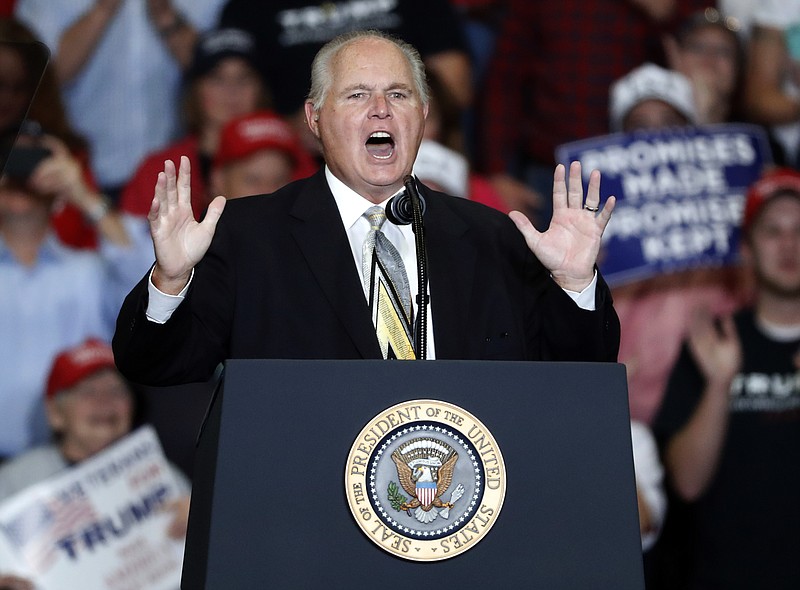Talk radio host Rush Limbaugh, who died Wednesday from lung cancer at the age of 70, was arguably the most important figure among American conservatives between Ronald Reagan and Donald Trump (who could rightly be said was never a true conservative but certainly had the following of millions of them).
His eponymous show had been nationally syndicated since 1988, the pre-internet years when most people got their news from the three broadcast networks, ABC, CBS and NBC, all of which leaned slightly left, and CNN, which also leaned left but was only in its first decade of existence, and from daily newspapers, which in the most of the nation's big cities also leaned left.
Further, when Limbaugh's show went national, Reagan was in his last year as president, but the country was in the middle of a period when Democrats ruled the United States Senate for 52 out of 62 years between 1933 and 1995 and the House for 58 out of 62 years over the same period.
Republicans and conservatives, despite their denizens being around half the country, had no national voice outside of a magazine or two with relatively little circulation and some newspaper editorial pages.
But Limbaugh, jovial and smart, was confident about going up against his outsized opposition. "I am equal time," he assured listeners.
And he had listeners. Indeed, the show would grow to be the most listened-to radio show in the country. It was syndicated on more than 650 stations, and in December 2019, Talkers Magazine estimated the show attracted a cumulative weekly audience of 15.5 million listeners.
Locally, it has been syndicated since or near its inception by WGOW-AM. The program grew so popular in the 1990s that here and in other cities restaurants opened "Rush Rooms," where the show could be heard during its noon to 3 p.m. time slot as customers ate their lunches.
The buzz from conservatives in Limbaugh's early nationally syndicated years was that nobody else was saying what they thought and espousing what they believed. He became their voice.
In doing so, he may have saved the moribund communications medium of A.M. radio, which had long passed its golden era when he began his national show. Thanks at least in part to him, the medium today is a staple for talk radio. And because of that contribution, not because of his political views, he was inducted into the National Radio Hall of Fame and the National Broadcasters Hall of Fame.
Limbaugh resonated not only because he had the temerity to challenge the Democratic establishment and speak truth to what was then unchecked power but because he did it with intelligence and humor. And that was something new. Only Republicans and conservatives were supposed to be the butt of jokes, their interest in patriotism and family values soft spots into which Democratic sticks could be poked.
But the Missouri native and college dropout turned the tables. He made fun of the excesses of the left, turned a mirror on their hypocrisies and challenged their authority, something Trump would do 25 years later. He became their sworn enemy, just as Trump would be.
As Limbaugh did that, he also espoused the beliefs Republicans and conservatives believed in - the Constitution, smaller government, a prepared military and freedom, among others. As his radio program grew in popularity with the advent of the Bill Clinton administration in 1993, many Americans feared an erosion of some of those principles with first lady Hillary Clinton's planned government takeover of health care.
So, we don't think it's unreasonable to at least partially credit the broadcaster for the vote that swung both the Senate and House to the Republican side in the 1994 midterm elections. And for keeping the pressure on the first couple's numerous scandals during Clinton's two terms. And for the start of Fox News in 1996, a cable news network that leaned right to counter the existing news outlets on the left.
Limbaugh, from the outset, was a polarizing figure. He was immediately loved and welcomed by those on the right and his every utterance excoriated by those on the left. However, in today's culture where sharp humor is termed hate, where college students rush to "safe spaces" when their world views are challenged and when the intolerant are only people who don't believe as "we" do, Limbaugh was viewed as a Neanderthal. That's why his obituaries have carved out large chunks to talk about his intemperate remarks, though those of non-conservative radio talk show hosts Howard Stern and Al Sharpton are given a pass.
The left in America may be giddy today because a wildly popular conservative voice has been stilled, but the man who called himself "The Doctor of Democracy," who deadpanned that he had "talent on loan from God" and who bragged he spoke "with half my brain tied behind my back just to make it fair" lives on in a world he helped make where the media is no longer solely the mouthpiece of one party and one set of political beliefs.
